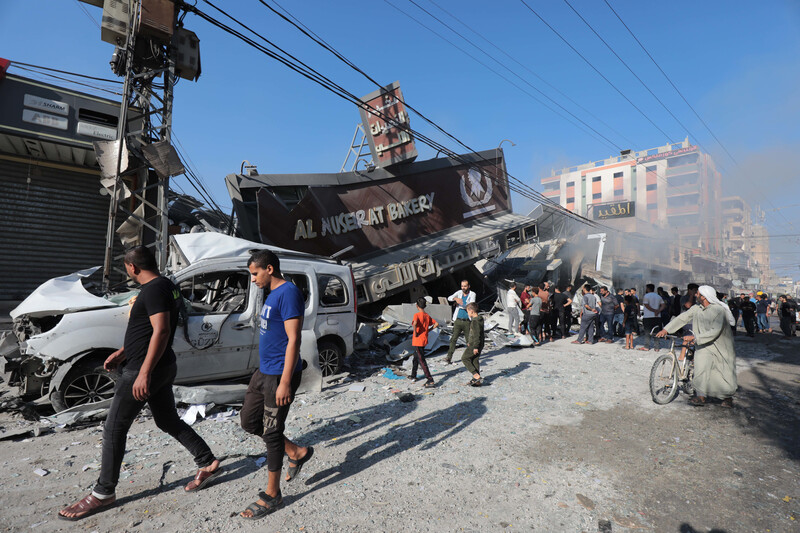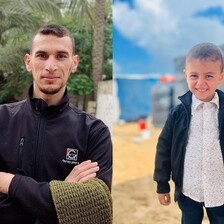The Electronic Intifada 25 October 2023

With Israel targeting civlian infrastructure like bakeries, and blockading deliveries of basics, food and water are now scarce commodities in Gaza.
APA imagesThere were five days to go.
I had picked my dress, invitations had been sent, and the hall was booked. I had selected the perfect makeup artist to make me look like a princess.
I was ready and eagerly anticipating my wedding to my fiance, Amir.
But as I looked at the calendar, counting down to the big day, fate had other plans. I heard the bullets. I knew immediately: the resistance had started their response to Israeli attacks on Al-Aqsa and Palestinian prisoners.
Little did I know that these sounds would become the backdrop to a harrowing journey that would test love, resilience, and hope.
The first things to go were the nightly phone calls — a comforting ritual that bridged the physical distance between Amir and myself. Once Israel attacked, we were left without electricity, water, and reliable internet. From my home in northern Gaza, communication with Amir, who also lived in the north, became increasingly challenging.
Now, with faltering electricity and unreliable internet, I lie awake at night, anxiously awaiting a message from him.
Our once-unbreakable connection had become fragile, a painful reminder of how circumstances beyond our control were stealing away the simple joys.
Israel then issued grave threats, telling residents to abandon their homes. Amir and his family chose to stay.
Hundreds of others headed south in search of safety, only to be met with airstrikes.
Every night, as I lie in bed, the precariousness of our situation weighs heavily on me. We were on the brink of beginning our new life together, yet we have been caught in a relentless spiral of uncertainty and fear.
We longed to be together, to plan our future, and to share our dreams, but instead war has disrupted all plans and left us wondering if there is a future at all, let alone a future for us.
Are you okay?
It was with a heavy heart that I accepted that our dream wedding would have to be canceled.
But amid all the chaos and heartbreak, our love has endured.
Amir and I cling to the hope that, one day, we will reunite, celebrate our love, and rebuild our dreams. The war on Gaza has taken much from us, but it has not broken us.
But it has changed us. In the destruction and uncertainty of Gaza, a simple yet profound question is now a constant in our lives, a question that seems to have no real answer: “Are you okay?”
Each time it is asked, it carries the weight of our shared struggle. The truth is, no one is truly okay in the midst of these relentless airstrikes and such massive upheaval.
But despite the odds, our response has so far been the same. “I am okay,” a silent pact to reassure each other and maintain a semblance of normalcy.
Our conversations have shifted from wedding arrangements, bachelorette parties, and rose colors adorning the hall, to a singular, heartfelt desire — to just be okay.
Since the start of the aggression, the Israeli airstrikes claimed the lives of at least six members of my family, including my beloved uncle, Zakaria, aged 50.
The last time I saw him was on a peaceful Friday, where he inquired about my wedding date, hoping to make arrangements to attend.
Zakaria was more than just a family member; he was a highly respected political leader in Hamas. He was deeply cherished by our relatives and the local community. Each time I spoke about him, I felt an overwhelming sense of pride.
Yet, none of this matters to Israel. My wedding, my uncle, the lives of 2.3 million Palestinians in Gaza. Nothing matters.
The casualty list now tops 7,000. One million people have been forced to leave their homes and are huddling in crowded UN schools or with friends and relatives in the south.
More than 2,500 children have been killed. Whole families have been wiped out. Water and food are now scarce commodities. There is no electricity and no fuel, and hospitals are warning that they will soon be unable to function at all.
In this hell, being okay is a small victory.
Bashaer Muammar is a Palestinian activist and translator from Gaza.





